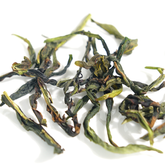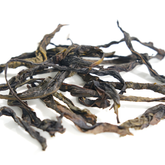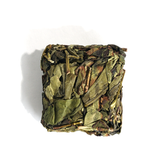Can Tea Still Infuse in Cold Water? Exploring the Process and Benefits of Cold Brew Tea
Cold brew tea is a popular method of making tea without using hot water. Instead of boiling water, you simply add tea leaves to a sealed bottle and let them steep in the fridge. In just 2 to 12 hours, the tea slowly infuses, creating a beverage rich in color, aroma, and flavor. This cold brew tea method uses room-temperature mineral water, boiled water that has cooled, or even ice water, allowing the tea leaves to gently release their natural fragrance and nutrients. The result is a refreshing tea that retains its original taste and freshness while minimizing the bitterness often produced by hot water brewing. Whether you're a tea lover or a cold brew enthusiast, cold brew tea offers a smooth, crisp flavor that's perfect for a warm day. In this article, we will explore the principles and effects of cold water tea infusion, as well as which types of tea are best suited for cold brewing. This will help you better understand the wonders of cold water tea brewing.
In this article, we will explore the principles and effects of cold water tea infusion, as well as which types of tea are best suited for cold brewing. This will help you better understand the wonders of cold water tea brewing.
Key Data:
Cold water (4°C) infusion for 6 hours releases about 60% of the catechins compared to hot water (80°C), but only 35% of the caffeine (Source: "Food Science" Journal, 2022 experiment).
Cold brew tea retains a higher percentage of amino acids, resulting in a more prominent umami taste (Data from the Japanese Tea Industry Laboratory).
Advantages and Disadvantages of Cold Brew Tea
| Advantages | Disadvantages |
| Fresh taste: Cold brew tea preserves the natural aroma and fresh taste of the leaves, with a smooth and non-bitter brew. | Longer brewing time: Cold brew tea typically requires 4 to 12 hours, or even longer. |
| Reduces bitterness: Cold brewing minimizes the extraction of bitter compounds (such as tannins) in the tea leaves. | Lower tea concentration: The concentration of the tea may be lower compared to hot brewing. |
| Retains more nutrients: Cold brew tea better preserves water-soluble compounds like amino acids and vitamins. | Needs proper storage: Cold brew tea needs to be brewed under refrigerated or cold storage conditions. |
| Lower caffeine content: Cold brew tea releases less caffeine, making it suitable for people sensitive to caffeine. | Limited tea varieties: Not all types of tea are suitable for cold brewing, and the results vary by tea type. |
Basic Principle of Cold Water Infusion for Tea Leaves
The process of releasing flavor and nutrients from tea leaves in water depends on the impact of temperature. Hot water accelerates the dissolution of components in the tea leaves, such as catechins, caffeine, and amino acids. Cold water, however, releases these components more slowly due to the slower molecular movement, which is why cold water infusion takes longer. When tea is brewed in cold water, the components are not immediately extracted in large quantities but dissolve more gently, resulting in a lighter, smoother taste.
Polar Substances First: Cold water is more effective at dissolving high-polarity components (such as amino acids and sugars), while low-polarity substances (like caffeine and esters) are released more slowly.
Comparison with Hot Brewing: Hot water brewing breaks down the structure of the tea leaves with high temperatures, releasing all components rapidly. Cold brewing, on the other hand, is a selective extraction, resulting in a sweeter and lighter taste.
Osmotic Pressure Difference: The cell walls are less likely to break at low temperatures, requiring an extended infusion time to promote the diffusion of the components.
Cold Water Infusion Time and Effects
Compared to hot water brewing, cold water infusion takes much longer. Typically, cold water tea requires 4 to 12 hours, or even longer, depending on the type of tea and the desired strength. During cold infusion, the tea gradually extracts flavors from the leaves. Over time, the tea's flavor becomes richer, but it does not release the bitterness as quickly as hot water does. Overall, cold water tea is characterized by a fresh, smooth taste with little to no bitterness.
Types of Tea for Cold Water Infusion
Not all types of tea are suitable for cold water infusion. Generally, green tea, white tea, and certain herbal or fruit teas are very suitable for cold brewing.
| Tea Type | Recommended Varieties | Suitability for Cold Brew |
| Green Tea | Longjing (龙井), Biluochun (碧螺春) | Green tea, with its delicate flavor and natural fragrance, is ideal for cold brew. |
| White Tea | Anji White Tea (安吉白茶)、Sliver Needle、Bai Mudan | White tea's fresh and sweet aroma is gently released in cold water, offering a refreshing taste. |
| Herbal Tea | Mint Tea (薄荷茶), Chrysanthemum Tea (菊花茶) | Herbal teas are more fragrant and have a softer taste when brewed in cold water. |
| Fruit Tea | Cold brew fruit tea | Fruit teas highlight the natural sweetness of tea polyphenols and fruity aromas, perfect for summer. |
| Not Recommended | Heavily roasted Oolong, Pu'er Ripe Tea (普洱熟茶) | These teas may not brew well in cold water as the full-bodied flavor doesn't develop in low temperatures. |
How To Cold Brew Tea(Jasmine Tea)
(Jasmine teas most recommended)
| Step | Action | Details |
| 1 | Prepare the tea utensils | Choose a clean glass bottle or teapot, ensuring the container is dry and free of water. |
| 2 | Measure the appropriate amount of Jasmine tea | Use 2-3 grams of Jasmine tea for every 200ml of water. |
| 3 | Add cold water | Pour mineral water or cold boiled water into the tea container. |
| 4 | Seal the container and refrigerate | Pour mineral water or cold boiled water into the tea container. |
| 5 | Remove and filter the tea | After the steeping time, take out the tea and strain out the leaves. |
| 6 | Enjoy the cold-brewed Jasmine tea | The tea is clear, aromatic, and refreshing, perfect for summer. |
Health Benefits of Cold Water Infused Tea
When tea is infused in cold water, some beneficial compounds, such as catechins, antioxidants, and vitamins, can be preserved. Additionally, the cold brewing process is milder, which reduces the bitterness and caffeine release, making it an ideal choice for those sensitive to caffeine. Cold-brewed tea contains less caffeine, making it a great option for people who want to stay alert without consuming too much caffeine. Furthermore, cold-brewed tea can retain more of its natural aroma, enhancing the overall drinking experience.
Common Misconceptions and Precautions
Misconception 1: Cold water cannot brew tea. In fact, cold water can brew tea, but the process is much slower than hot water. As long as you use the correct time and tea-to-water ratio, cold-brewed tea can still showcase its unique flavor.
Misconception 2: Cold-brewed tea doesn't have any flavor. Although cold-brewing extracts flavors more slowly, the aroma and taste from the tea leaves will still gradually be released. Therefore, cold-brewed tea still has a rich flavor, especially with its natural floral and fruity notes.
Misconception 3: Cold-brewed tea requires too much time. While cold-brew tea takes longer, it doesn't mean that the longer, the better. The infusion time should be adjusted based on the type of tea and personal taste preferences to avoid the tea becoming too strong or losing its original flavor due to excessive brewing time.
Misconception 4: Does Cold-Brewed Tea Foster Bacteria?Experimental evidence shows that when tea is cold-brewed for up to 12 hours, the total bacterial count remains within safe limits (complying with the GB 7101-2022 standard). It is recommended to use sterilized containers, and you can first rinse the container with boiling water before storing it in a refrigerated environment.
SEE MORE CHINESE TEAS
If you have questions about selecting tea:
Learn-more-about-chinese-tea
If you have questions about the benefits of tea:
Health-benefits-of-chinese-tea
If you have questions about brewing tea:
How-to-brew-loose-leaf-tea






